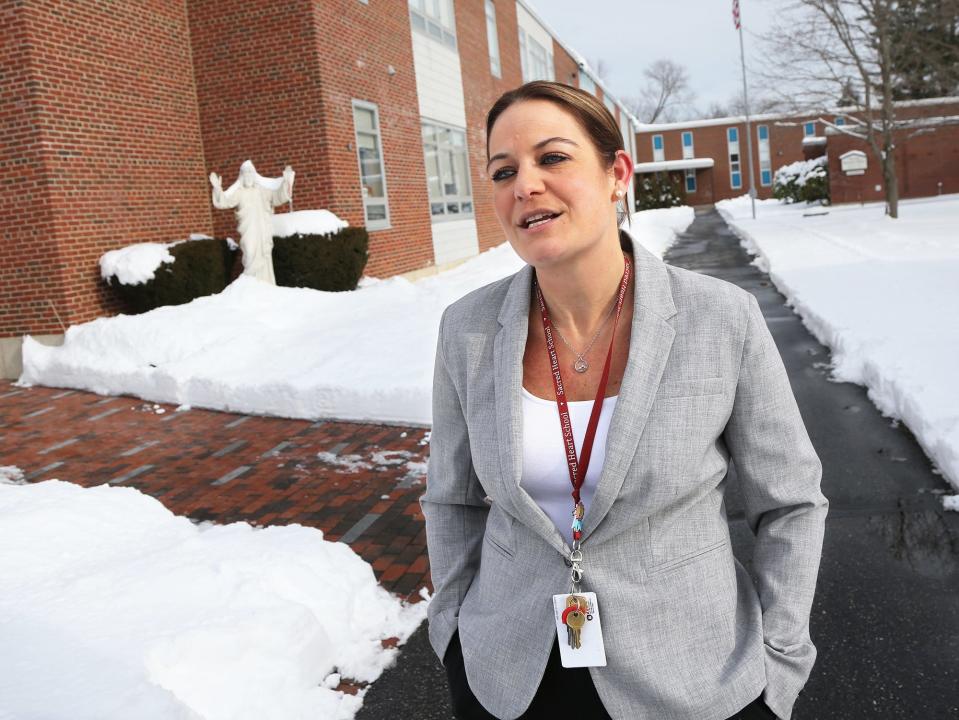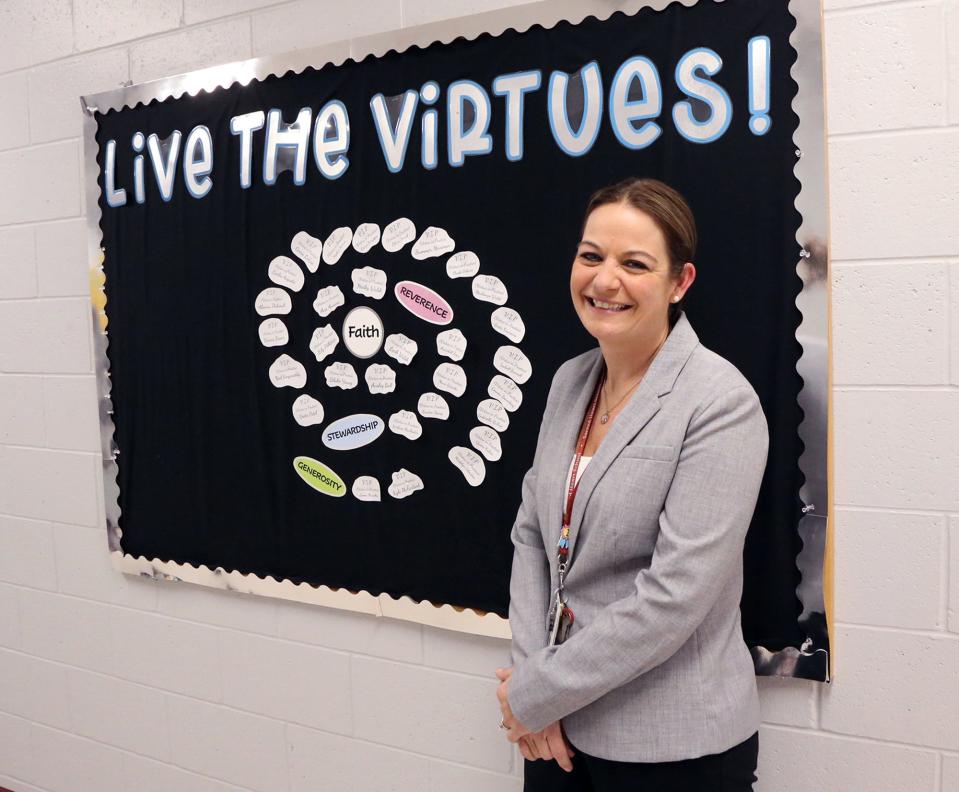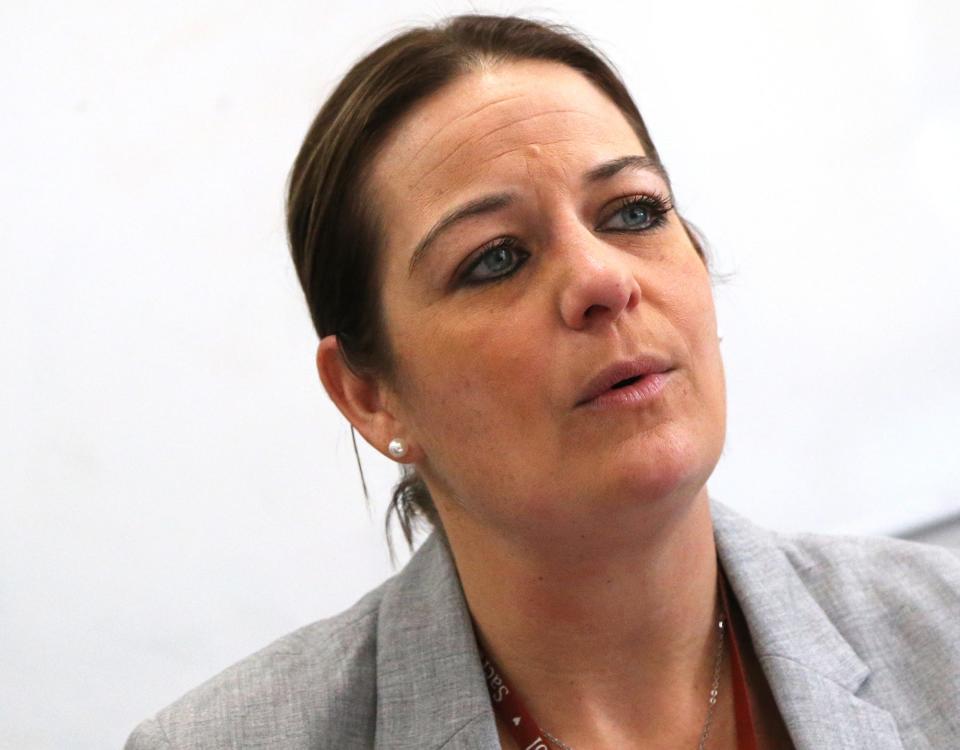Hampton’s dilemma: Should public money go to a private religious school?
HAMPTON — A debate over public funding for Sacred Heart School continues as critics consider whether tax dollars should go to the private K-8 school.
For years, voters have approved a warrant article at the Town Meeting to pay for student benefit services, specifically for Hampton children attending the Catholic school on Route 1 in Hampton. This year’s article seeks $52,521, the money to be spent on non-religious costs like the salary for the school nurse.
While the article passed with ease for decades, proponents of the funding have recently clashed with critics who fear the practice violates the separation of church and state. Last year an opponent of the article put forth a nonbinding citizen petition asking voters to no longer provide public tax dollars to religious or private schools.

No such petition is on the ballot this March, but the School Board and Budget Committee each heard from opponents of the funding in December. The Budget Committee and School Board both voted to recommend funding for Sacred Heart.
The School Board's vote was 2-0 with three abstentions. Board members Andrea Shepard and Frank Deluca abstained because they were members of the church, according to meeting minutes. Deluca also has grandchildren who attend Sacred Heart.
Democratic State Rep. Chris Muns, who spoke against the funding, said recent national discussion on schools has drawn the public’s attention more squarely on local education.
“I think it’s time to speak out about it,” Muns said. “Funding for public education is such an important issue that when you look at the money that we’ve been spending, or giving to Sacred Heart, it kind of begs the question, should we be doing it?”
Supporters of the funding argue that it is allowed under state statute and helps students from Hampton. Sacred Heart Principal Maegan Koelker called the funding a “student first approach” to education and argued every Hampton student deserves the support of their community.
“Our Hampton residents choose where to send their students to school,” Koelker said. “A student is a student, a child is a child, regardless of which building they walk into each and every day.”
Hampton development 2024: Casino makeover, downtown apartments, senior housing and more
Tax dollars for Sacred Heart School go back decades
Sacred Heart has been open at 289 Lafayette Road since 1963, the parish school for Our Lady of the Miraculous Medal Parish. The practice of sending tax dollars to assist with non-religious services goes back at least 40 years, according to published articles. SAU 90 Superintendent Lois Costa said the practice began to help with student enrollment that was overcrowding Hampton's public schools.
The New Hampshire state constitution has a clause that states no tax dollars shall ever be for "schools or institutions of any religious sect or denomination."
Proponents of the funding point to New Hampshire state law, however, which states school boards may provide a number of services to nonpublic schools within the state. Those services include school nurse services, transportation, textbooks, education television services, programs for children with disabilities and physical education.

Eileen Nevins, an attorney who spoke at the Budget Committee meeting, pointed to a New Hampshire Supreme Court opinion from 1969 defending public funding for secular purposes in religious schools. The justices wrote that secular education in a religious school may be supported by tax money “if sufficient safeguards are provided.”
“I urge you to once again be fair and support it,” Nevins told the Budget Committee. “And allow our children in Hampton, whose parents also pay taxes, to get the benefit of this statute and this opinion.”
Seabrook Station: NextEra seeks NRC approval to change nuclear plant's emergency plans
Residents reconsider Sacred Heart School funding
Hampton mother Sarah Elliott, who opposes the public funds going to Sacred Heart, believes the practice was introduced with good intentions.
“For the most part, people are happy to do it because it seemed like kindness,” Elliott said. “Kindness is really the backbone of this community.”
Elliott said she found herself questioning the annual warrant article because she did not think any public tax dollars should be going toward a private school. She is a strong supporter of the Hampton public schools, her three children having attended them.
“For me, it’s more that we’re not giving public funds to private institutions,” Elliott said.
Last year, Elliott put forth a nonbinding citizen petition to go on the Hampton School District ballot asking for “funds to not be dispersed or redistributed to any private, charter, or religious school or institution.” The article’s meaning was altered by a vote at the deliberative session, sending it to the ballot with new language that read “may be dispersed” to private, charter or religious schools.
Voters approved funding for Sacred Heart School by a vote of 1,291 to 745. Meanwhile, a majority voted down the petition asking if the funds may be dispersed.
“More people said that we should not do this,” Elliott said. “To me, that was a pretty good indication that people don’t really understand that we’re raising money in that budget and then dispersing to Sacred Heart.”
Fort Rock trails at risk: How Exeter, Newfields look to save 148 acres from development
Sacred Heart principal: Funding helps Hampton students
Koelker, who became principal at Sacred Heart three years ago, said the amount sought each year in the warrant article is based on the number of Hampton students. This year’s request is an 8.66% decrease from last year’s request.
The funds are kept by SAU 90 when allocated after voting day, according to Koelker. Sacred Heart sends purchase orders for non-religious education technology, supplies and instructional materials to SAU 90 Director of Finance Mariah Curtis, she said, and then Curtis pays the vendors directly.

The only funds that Sacred Heart handles at all are those that go towards the nurse’s salary, but Koelker said a paper trail easily demonstrates the funds go directly to payroll.
“We are not determining who is getting this money and where,” Koelker said. “All of our POs get shipped directly there (to SAU 90).”
For some opponents, the paper trail is not enough to satisfy the concern that public money is going toward religious education. Muns said financial assistance in one part of the budget only lightens the load for others.
“My counterargument to that is money is fungible,” Muns said.
Koelker acknowledges that the town providing funding for Sacred Heart is “unique” compared to most communities. The school has also historically asked Seabrook for funding, though the warrant article does not always get approved.
In the Budget Committee meeting, Koelker heard others say the funding only helps wealthy families from other communities like Hampton Falls. Koelker called the statement inaccurate and said Hampton's Sacred Heart families send kids there for a variety of reasons. She said the school works to keep tuition affordable, and the annual warrant article is an example of the community working to give Hampton students the education that is right for them.
Tuition costs $7,163 per student per year for grades K-5 and $7,463 for grades 6-8, according to the school's website.
“I feel really strongly that this school is here to meet the needs of students that might need an alternate path to a traditional education,” Koelker said. “It’s important to me that this community still has that as an option for their children.”
This article originally appeared on Portsmouth Herald: Hampton residents split over tax money for Catholic school

